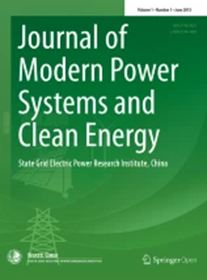Dynamic Nonlinear Droop-Based Fast Frequency Regulation for Power Systems with Flexible Resources Using Meta-Reinforcement Learning Approach
IF 6.1
1区 工程技术
Q1 ENGINEERING, ELECTRICAL & ELECTRONIC
Journal of Modern Power Systems and Clean Energy
Pub Date : 2024-10-07
DOI:10.35833/MPCE.2024.000062
引用次数: 0
Abstract
The increasing penetration of renewable energy resources and reduced system inertia pose risks to frequency security of power systems, necessitating the development of fast frequency regulation (FFR) methods using flexible resources. However, developing effective FFR policies is challenging because different power system operating conditions require distinct regulation logics. Traditional fixed-coefficient linear droop-based control methods are suboptimal for managing the diverse conditions encountered. This paper proposes a dynamic nonlinear基于元强化学习方法的柔性资源电力系统动态非线性下垂快速调频
可再生能源的日益普及和系统惯性的减小给电力系统的频率安全带来了风险,需要开发利用柔性资源的快速频率调节方法。然而,制定有效的FFR政策具有挑战性,因为不同的电力系统运行条件需要不同的监管逻辑。传统的基于固定系数线性下垂的控制方法对于管理遇到的各种情况是次优的。本文提出了一种基于${P}-{f}$下垂的动态非线性FFR方法,该方法采用新建立的元强化学习(meta-RL)方法,在保证电网稳定性的同时增强控制自适应性。首先,我们将各种运行条件下的最优FFR问题建模为一组马尔可夫决策过程,并据此提出频率稳定约束的元rl问题。为了解决这个问题,我们构建了一种新的分层神经网络(HNN)结构,该结构包含了理论上的频率稳定性保证,从而将受限的元rl问题转换为更易于处理的形式。最后,我们提出了一种利用问题固有特征的两阶段算法,在解决基于hnn的元强化学习问题时实现了增强的最优性。仿真验证了所提出的FFR方法在不同的运行条件下具有更好的适应性,并且在调节性能和成本之间取得了比基准更好的平衡。
本文章由计算机程序翻译,如有差异,请以英文原文为准。
求助全文
约1分钟内获得全文
求助全文
来源期刊

Journal of Modern Power Systems and Clean Energy
ENGINEERING, ELECTRICAL & ELECTRONIC-
CiteScore
12.30
自引率
14.30%
发文量
97
审稿时长
13 weeks
期刊介绍:
Journal of Modern Power Systems and Clean Energy (MPCE), commencing from June, 2013, is a newly established, peer-reviewed and quarterly published journal in English. It is the first international power engineering journal originated in mainland China. MPCE publishes original papers, short letters and review articles in the field of modern power systems with focus on smart grid technology and renewable energy integration, etc.
 求助内容:
求助内容: 应助结果提醒方式:
应助结果提醒方式:


